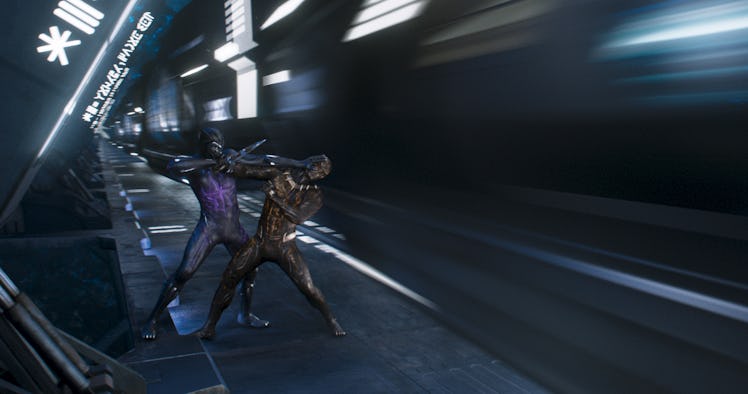
The Final 'Black Panther' Battle Scene Left Fans Screaming At The Tops Of Their Lungs
When the reviews of Black Panther arrived, the consensus seemed to be that the film was different. “It’s not like any Marvel movie that’s come before,” was a refrain. But upon seeing it myself: They’re wrong. Black Panther is a Marvel movie, with all the plot points and clichés contained therein. That doesn't mean it's bad. It's great because they made it work within the framing. but it also means the film ends with a mano-a-mano fight between the good and bad guy. But this Black Panther battle scene was one for the ages, and really hammered home why this film was so different. Warning: Spoilers for Black Panther follow.
Black Panther is your classic Marvel hero’s journey. Like the early origin stories of Captain America and Thor in Marvel’s Phase I, the story of T’Challa’s coming of age as King of Wakanda follows the familiar trajectory. We see him doubt himself. We see him impulsively choose to go out to take down Ulysses Klaue, to right his father’s one failure, only to fail himself. We see him contend with the reality his father was not perfect. There are even places the dialogue collapses so into traditional hokum, the movie has to pull back and laugh at itself. (Thank you, M'Baku, I believe they were done.)
But when it boils down to the final major set piece of the film, the battle of T'Challa and the Dora Milaje against Killmonger and W'Kabi's border tribe, things are once again different. It hits all the usual plot beats, including the reveal that Erik had his own variation of the Black Panther suit, so hero and villain are on equal turf. But this is not a fight to the death.
Killmonger assumes it is one, but as we've seen early in the film, T'Challa sees these challenges for the throne as battles to make one's opponant yield, not kill them. M'Baku challenged T'Challa, he accepted defeat and lived. T'Challa wants desperately for Killmonger to see the wisdom of such a choice. He doesn't have to die. He can live, and they can find a way to make it work.
Before coming back from the ancestral plane, T'Challa already made the decision to listen to Nakia. Wakanda is strong enough to support the diaspora, and protect itself. He can stay true to not using Wakandan weapons to conquer but to use their science and tech to inspire. He wants Killmonger to join him. He believes they make the world better without conquering. That's why he uses the sonic panels to disrupt the suits, in hopes they will both live.
But he doesn't consider the hate Killmonger has filled himself up with is all he has. Erik doesn't know how to live without hate. He was left behind by T’Chaka in a world created via of centuries of systematic racism that Wakanda sidestepped all those years. He grew up in the projects during the height of the crack epidemic, was thrown into the foster system as Clinton dismantled the safety net and began the era of mass incarceration, and joined the army to pay for education, only to find himself in Afghanistan and Iraq post 9-11.
Killmonger should have read more.
For the master's tools will never dismantle the master's house. They may allow us temporarily to beat him at his own game, but they will never enable us to bring about genuine change.
That's a quote from Audre Lorde, a civil rights activist and poet. It's one Erik's father, N'Jobo probably would have known, but one neither father nor son took to heart.
Killmonger wants "the sun to never set on the Wakandan Empire" much like it once never did on the British one, which colonized much of Africa. But taking the same tools and committing the same wrong won't make the world right.
In the end, Killmonger doesn't want to live in a world where he can't hate. For him, to try and live in harmony with his former colonizers, after the millennia of cruelty visited upon his people, would be bondage. "Bury me in the ocean," he commands instead. It's a stunner of a line, and one that left audiences shattered. Now that's how you stage a final battle,